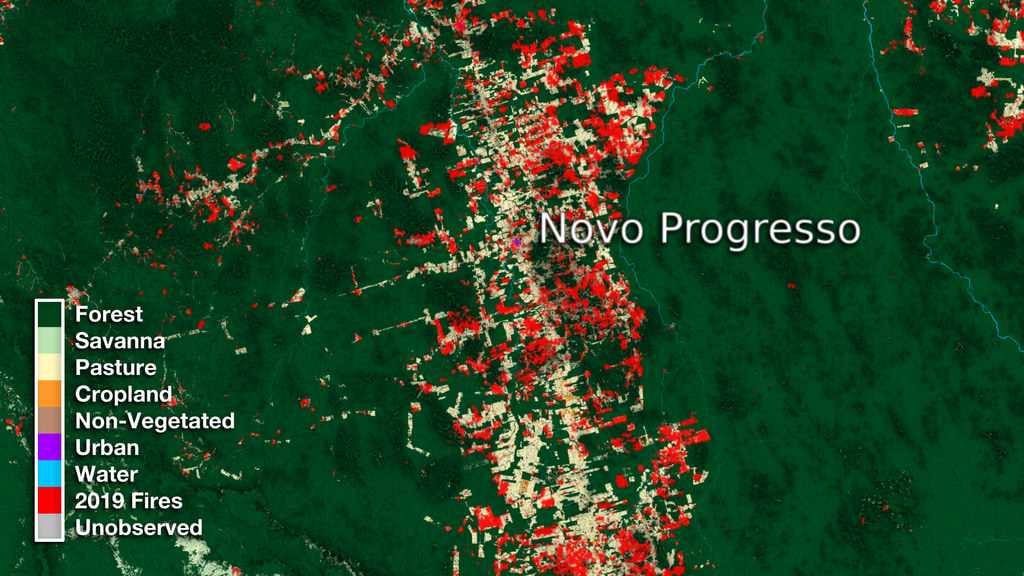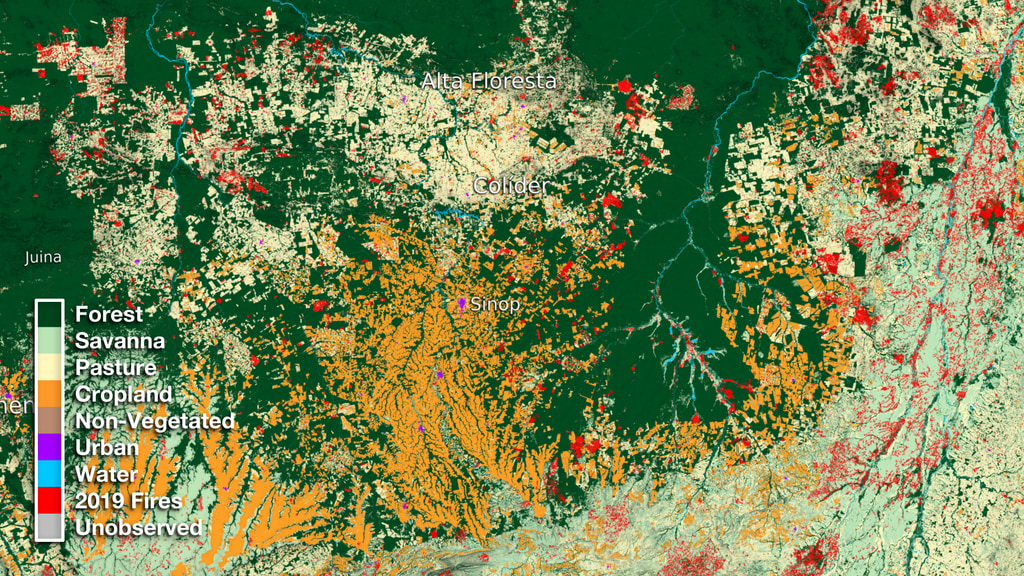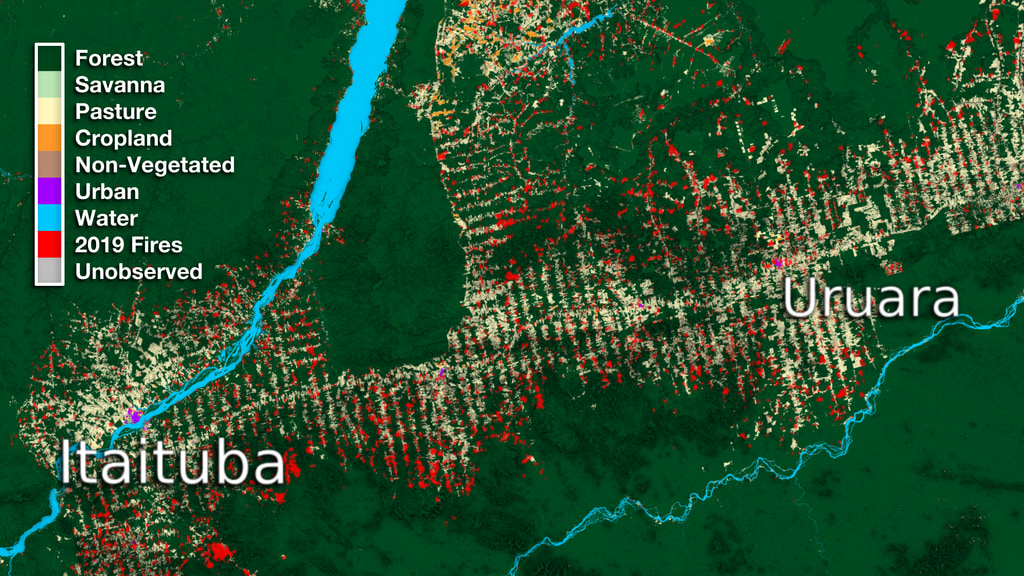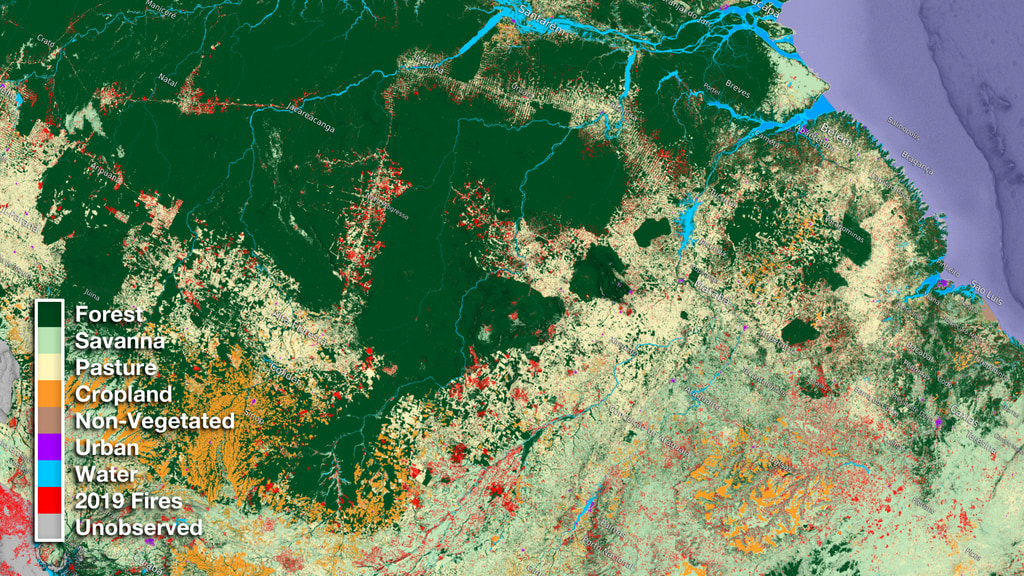Uatumã Biological Reserve Over Time
This data visualization begins with a wide view of Northern Brazil. It then zooms down to the Uatumã Biological Reserve and compares its relative size to the San Francisco Bay area. Next we cycle through over three decades of land use transformation to show the lake formation over time as well as the increased pasture and croplands to the west of the lake. Lastly, we fade in 2019 fire data to indicate how the data will continue to change into the upcoming year.
The Amazon has undergone major transformations throughout the past three decades (1985 - 2018). Working closely with their Brazilian counterparts, NASA scientists have mapped the entire country of Brazil to show different kinds of land use throughout the country. This data is based on the
As part of this, we look at the construction of the Balbina Dam and how it changed the Uatumã Biological Reserve from 1985 to 2018. 2019 fire data is also used to show controlled burns in order to clear cut forest areas for other use.
This data visualization is the same as the one above, except it does not contain the colorbars, dates, or size comparisons. It is intended for editors who want to include their own graphics atop the data visualization.

Color map for the different land use classifications.
Match rendered year overlay for compositing.

Still image of the San Francisco Bay area to be used in post production to compare the size of the region around Rio Branco.
- Agricultural Engineering
- Agricultural Expansion
- Agricultural Lands
- Agricultural science
- Agriculture
- Amazonia
- Biology
- Biosphere
- Brazil
- Coastal Processes
- Deforestation
- Earth Science
- Environmental Impacts
- Environmental science
- Forest Composition/Vegetation Structure
- Forest Conservation
- Forest Harvesting and Engineering
- Forest Management
- Forest Science
- Forestry
- Habitat Conversion/fragmentation
- Human Dimensions
- Human geography
- Human Settlements
- Hydrology
- Hydrosphere
- Hyperwall
- Location
- Mangroves
- Oceans
- surface water
- Terrestrial Ecosystems
- Urban Areas
- Urbanization
- Urbanization/urban Sprawl
- Vegetation
- Water Channels
Credits
Please give credit for this item to:
NASA's Scientific Visualization Studio
-
Data visualizers
- Alex Kekesi (Global Science and Technology, Inc.)
- Greg Shirah (NASA/GSFC)
-
Producer
- Matthew R. Radcliff (USRA)
-
Scientist
- Doug C. Morton (NASA/GSFC)
-
Data provider
- Niels Andela (Science Collaborator)
-
Technical support
- Laurence Schuler (ADNET Systems, Inc.)
- Ian Jones (ADNET Systems, Inc.)
Release date
This page was originally published on Monday, April 19, 2021.
This page was last updated on Monday, January 13, 2025 at 12:13 AM EST.
Datasets used
-
Fire Pixels [Suomi NPP: VIIRS]
ID: 1053 -
Biomass Map (MapBiomas)
ID: 1084MapBiomas Project is a multi-institutional initiative to generate annual land cover and use maps using automatic classification processes applied to satellite images.
This dataset can be found at: http://mapbiomas.org
See all pages that use this dataset
Note: While we identify the data sets used on this page, we do not store any further details, nor the data sets themselves on our site.








![The Amazon is the largest tropical rainforest in the world, nearly as big as the continental United States. But every year, less of that forest is still standing. Today's deforestation across the Amazon frontier is tractors and bulldozers clearing large swaths to make room for industrial-scale cattle ranching and crops. Landsat satellite data is used to map land cover in Brazil with a historical perspective, going back to 1984.Music: Organic Circuit by Richard Birkin [PRS]; Into the Atmosphere by Sam Joseph Delves [PRS]; Ethereal Journey by Noé Bailleux [SACEM]; Wildfires by Magnum Opus [ASCAP]; Letter For Tomorrow by Anthony d’Amario [SACEM].Complete transcript available.Watch this video on the NASA Goddard YouTube channel.](/vis/a010000/a013600/a013694/Amazon_clearing_poster.jpg)